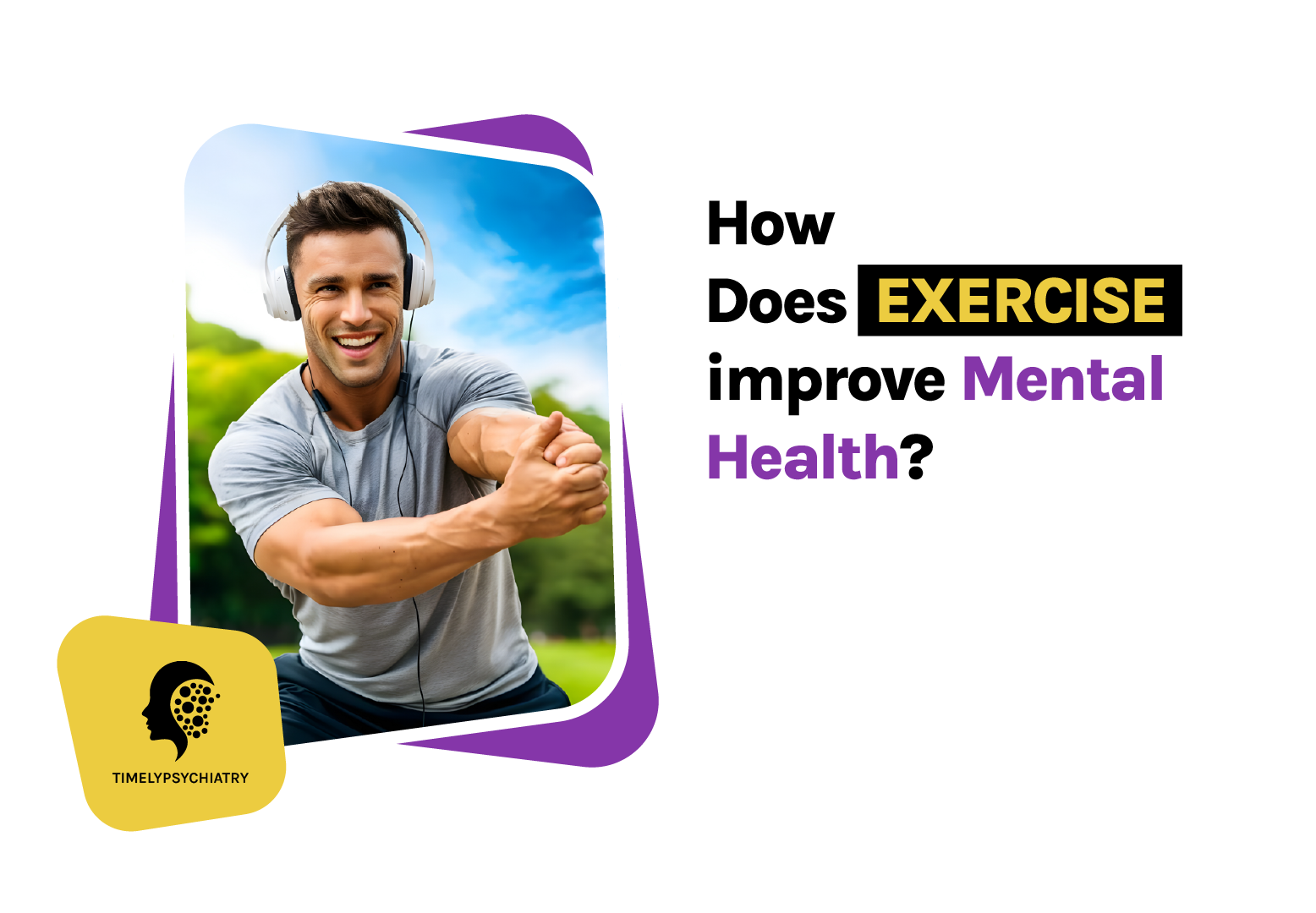We live in a busy world. Mental health matters a lot for our well being. So, how does exercise improve mental health? Most people know working out helps our bodies stay fit.
But, it does more. Exercise is great for our minds too. It helps reduce stress, worry, and sadness. It also improves spirits.
At Timely Psychiatry, we offer personalized mental health support designed to improve your well-being. For exceptional care, visit Timely Psychiatry. Need more information? Feel free to contact us.
Let’s see how adding regular exercise to your day can make you feel better mentally.
How Does Exercise Improve Mental Health?
Exercise you might try to get in daily has a big effect on how your mind feels. When you move around, your body lets go of endorphins. You could call these the “happy hormones.”
They make you feel over the moon and at peace. Besides this, physical work reduces hormones that make you stressed. Examples are adrenaline and cortisol.
Mix these benefits and you’ve got less stress, a brighter mood, and feelings of calm.
The Benefits of Mood Sport
Mood sport means moving your body can lift your spirits. Sports or other types of exercise can quickly affect how you feel mentally.
It’s been seen that people exercising are often brighter than those who don’t. This is because exercise:
- Increases blood flow to the brain
- Improves cognitive function
- Helps to manage emotions better
Why Is It Important to Ease into an Exercise Program?
Initiating a workout may appear hard, especially when you’re not accustomed to much activity. But gradually easing into it is key. Here’s why:
- You won’t get hurt. If you go intense right from the start, you might pull a muscle or twist something.
- You’ll stay motivated. If you push too hard at first, you might give up due to exhaustion.
- You’ll keep going. Starting slow and then increasing helps you to stay on track.
So, when you begin exercising, start at a slow pace and then boost up the intensity. Your body needs time to adjust to these new requirements.
Doing it this way lowers the risk of getting hurt and makes sure you can keep at it in the long run.
Using a Pedometer Can Promote a Physically Active Lifestyle
A pedometer is a tool for recording your physical activity. But, can using a pedometer promote a physically active lifestyle?
Absolutely! It notes your steps every day, pushing you to walk more. Such a piece of equipment can spark action. It also has the potential to boost your mental wellbeing.
Overall you need to take responsibility for your physical fitness to ensure you reap these mental health benefits.
The Ideal Exercise for Mental Health
Walking is an ideal exercise for people who are looking to better their mental well-being without excessively exerting their bodies.
Many people can do this gentle exercise just about anywhere, making it accessible to them. Walking regularly reduces depression and anxiety.
It lifts mood and improves self-confidence. Walking outside, especially in nature, can improve these benefits. It brings tranquility and fresh air.
How Exercise Reduces Stress?
Stress is common today. However, regular exercise can help. It boosts endorphins, our natural stress relievers.
Also, the benefit practice of regular exercise lowers cortisol, the stress hormone, in your body. This means that, when you exercise, you improve your mind as well as your body.
Fun Facts About Stress and Exercise
Here are some fun facts about stress and exercise:
- Breaking a sweat for just half an hour a day can greatly lower the signs of anxiety and depression.
- A constant routine of movement can better your sleep. Good sleep is key to reducing stress and improving your mental well-being.
- Taking part in exercise groups or sports can improve your social life. Having supportive friends around can lower stress even more.
What Is One Benefit of Starting an Exercise Program Slowly?
Taking it slow is key when starting a new routine. Slow and steady steps can make your body get used to new workouts. This lowers the chances of hurting yourself.
It’s a nice way to stay in the program for a long time. This method also strengthens your belief in what you can do. This is a must have for keeping your drive and regularity.
Exercise and the Nervous System
Many think exercise has no positive effects on the nervous system, but that’s wrong. Moving your body regularly improves brain power.
It leads to new brain cells and better thinking skills. This becomes even more vital as we age. Keeping the brain healthy can combat things like memory loss and severe issues like dementia.
The Role of Physical Fitness in Mental Health
Fitness to you may mean different things depending on your goals. But, it’s important to know that physical fitness is vital for mental health.
Not moving around much might cause issues like feeling down or worried. On the flip side, keeping active often could help in avoiding and dealing with these tricky situations
A physically active lifestyle may reduce the risk of mental health issues. So, exercise is vital for overall well-being.
The Impact of Exercise on Mental and Emotional Health
Moving our bodies does more than just help us physically. It touches our physical, emotional, and mental health.
Our physical and emotional health responds to our activity level. Exercise routinely helps handle and reduce the impact of mental health issues like:
- Depression
- Anxiety
- Stress
Moreover, it’s a healthy way to express emotions. This helps better our mood and emotional balance overall.
Exercises to Improve Mental Health
Various exercises can enhance mental health depending on your interests and physical ability. Let’s consider these workouts that are especially beneficial to mental wellness:
- Running: A good way to clear your mind. With each step, stress fades and endorphins kick in. It leaves you refreshed and energized.
- Yoga: It blends movement with deep thought, balancing your emotions and reducing tension.
- Swimming: A total body exercise that is gentle on your joints, suitable for any level of fitness.
- Walking: Just stepping outside can improve your mood, an easy mental exercise through physical activity.
The Importance of Consistency
Regular workout routines are crucial for maintaining mental health. Turning physical activities into everyday habits is crucial. This doesn’t imply you must take on rigorous workouts each day.
Even mild activities like strolling or biking can do wonders if you stick to them. We are asking everyone to focus on reducing idle time and work more exercise into their daily activities.
Conclusion
To sum up, how does exercise improve mental health? It does!
It lifts our spirits, lessens tension, and enhances well-being in general. If you weave regular physical fun into your day-to-day routine, you’ll catch onto the many mental perks.
It could be a daily saunter, a yoga routine, or a vigorous drill, keep moving! Focus on physical activity.
Remember, all factors that influence our physical fitness can be controlled. So, take charge of your health. Start moving today!
FAQs
Q: How much exercise is needed for mental health benefits?
30 minutes of moderate exercise a few times a week can improve mental health.
Q: How does regular participation in sports affect your body?
Regular sports strengthen your heart and muscles, keeping you fit. It also improves happiness and reduces stress.
Q: Are there specific exercises for anxiety and depression?
Yes, aerobic exercises like running and swimming, plus yoga, are effective.

